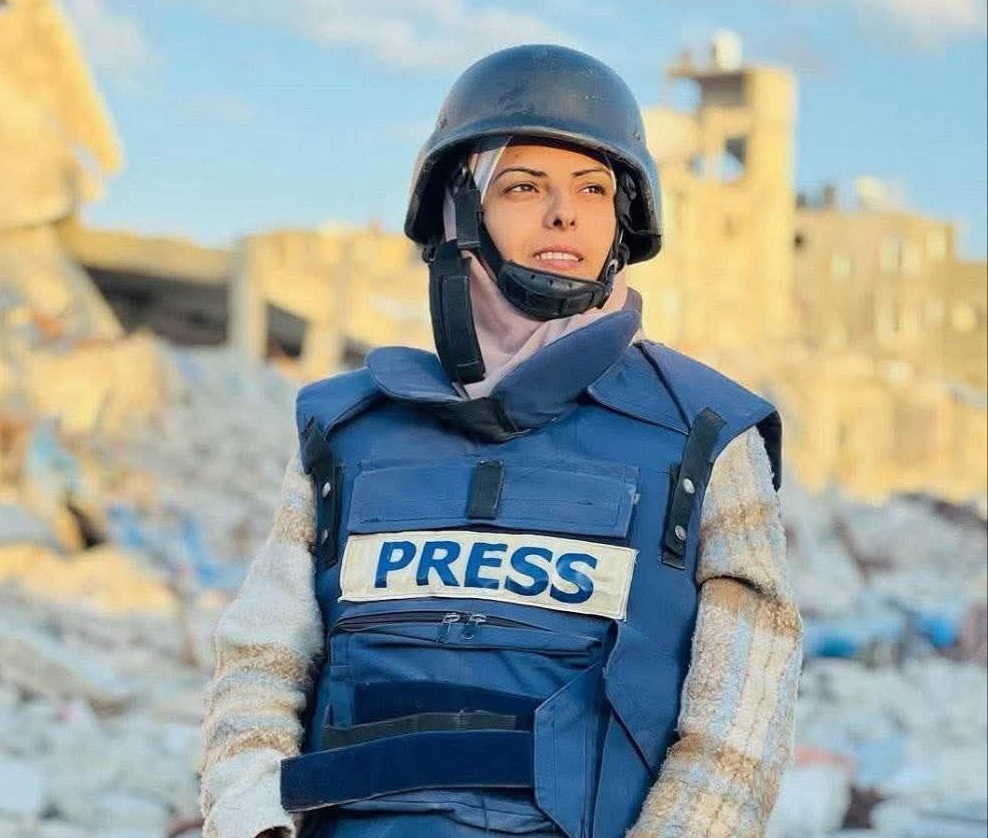Mariam’s last cry against the never-ending “inhuman treatment”
The photojournalist killed today in Gaza along with four other colleagues in a double Israeli raid on al-Nasser Hospital wrote about this in her accounts. Her photos and reels captured the everyday faces of suffering in Khan Yunis. Reporters Without Borders expressed their outrage over the 200 journalists killed in Gaza, asking how long the slaughter will continue? Caritas Internationalis slams “empty platitudes”, calls for an immediate ceasefire.
Milan (AsiaNews) – “Hi Assalamualaikum, thanks for following me. I hope you'll continue to share my posts and support Palestine, so the world can see the inhuman treatment we suffer every day...”
Just a few hours ago, Mariam Abu Dagga, a 33-year-old Palestinian photojournalist in Gaza working for the Associated Press, mother of one child, sent a message from Khan Yunis to those who followed her profile on X.
Her voice was one of the many that we monitor in Israel and Palestine to gather everything we deem significant about the tragedy that has been unfolding for almost two years.
On Mariam's profile, we observed the daily suffering in Gaza, which, as she wrote, cannot be deemed anything but inhuman. With the captions accompanying her shots, she told the stories behind those images. “Every day.”
Today it was her turn. Mariam was among the five journalists, all working for international media, killed this morning at al-Nasser Hospital in Khan Yunis in the second of two strikes by Israel.
They were killed while witnessing the damage caused by a war crime, since the bombing of a hospital is a war crime under international law. This was a double massacre that left at least 20 people dead, according to Palestinian sources.
The butchery of media workers has been relentless in the Gaza Strip for the past two years. Even before 7 October 2023, journalists died, like Shireen Abu Akleh, an Arab Christian Palestinian working as an Al Jazeera correspondent for many years in the Palestinian territories.
Fleeting figures depicted in a stereotypical manner, as if they had no history, no ideas, no perspective on reality they earned by living in Gaza’s harsh conditions.
“We are passers-by in this life, passing by like a cloud, we have nothing from it but our deeds,” Mariam wrote on her X profile, just a few days ago.
The strikes “hit the exterior staircase of the hospital where journalists frequently stationed themselves with their cameras. The strikes came with no warning,” said the Foreign Press Association.
The Israeli military responded by announcing its usual investigation into the incident, rejecting the accusation of deliberately targeting journalists.
“How far will the Israeli armed forces go in their gradual effort to eliminate information coming from Gaza?” asked Thibaut Bruttin, Reporters Without Borders director general.
“How long will they continue to defy international humanitarian law? The protection of journalists is guaranteed by international law, yet more than 200 of them have been killed by Israeli forces in Gaza over the past two years,” he added.
The killing of Mariam and the other four journalists (Hossam al-Masri, Moaz Abu Taha, Mohamad Salama, and Ahmed Abu Aziz) at al-Nasser Hospital came just as Caritas Internationalis launched a new appeal to stop the war-induced famine, which Israel continues to deny, despite the official statement by the United Nations a few days ago, claiming it is based on fabricated data.
“Caritas Internationalis bears witness to this horror,” writes the Catholic charity. “Civilians, mostly children and women, are being starved, bombed, and erased.”
Addressing an international community stuck on "empty platitudes", Caritas Internationalis calls for concrete action, demanding, “An immediate and permanent ceasefire. Unrestricted humanitarian access to end starvation and provide care. Release of all hostages and arbitrarily detained persons. Deployment of a UN peacekeeping force to protect civilians. Protection of all civilians, especially children, women, and the elderly.”
“The famine in Gaza is a test of moral integrity, and too many have failed. To starve a population is to desecrate life. To remain silent is to be complicit.
“Caritas Internationalis calls on all people of faith and conscience to raise their voices, pressure their governments, and demand justice. The world is watching. History is recording. And Gaza is waiting, not for words, but for salvation.”
15/12/2020 09:40
02/07/2025 14:14
22/10/2025 17:49







.png)










